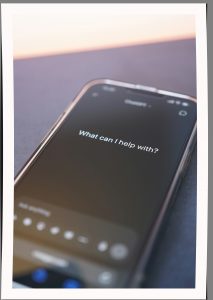
🌿 Why ChatGPT Isn’t a Therapist (and What It Can Help With)
In a world where everything seems to have an app or AI version, it’s no surprise that many people are turning to ChatGPT or other artificial-intelligence chatbots for emotional support. It’s fast, available 24/7, and feels safe to talk to – no waiting rooms, no scheduling, no judgment. But while ChatGPT can be a useful tool for mental-health education and self-reflection, it is not a substitute for therapy with a licensed mental-health professional. Here’s why that distinction matters – and how to use AI in ways that truly support your wellbeing.
🧠 Therapy Is About Connection, Not Just Conversation
Therapy isn’t just talking about problems – it’s about connection. A real therapeutic relationship provides empathy, attunement, and accountability. Your therapist listens not only to your words but also to your tone, emotions, and nonverbal cues. AI tools like ChatGPT can offer caring language, but they don’t feel compassion or form human bonds. Healing often happens in the space between therapist and client – a space where you feel seen, safe, and supported.
⚖️ Therapists Use Judgment – AI Uses Patterns
A licensed counselor or therapist uses clinical judgment, training, and ethics to guide each session. They consider your history, risk factors, diagnoses, and progress – and they’re accountable for your safety. ChatGPT, however, generates responses based on patterns in language. It can’t assess risk, recognize warning signs, or make diagnostic decisions. It doesn’t hold a duty of care or the ethical responsibility that comes with professional licensure.
🔒 Privacy and Confidentiality Are Not the Same
 When you meet with a licensed therapist, your sessions are protected by confidentiality laws and professional ethics. ChatGPT conversations, while stored securely, are not protected by HIPAA or the same privacy standards used in clinical care. If you share sensitive information, there’s no guarantee of confidentiality or data protection equal to that of a therapist’s office.
When you meet with a licensed therapist, your sessions are protected by confidentiality laws and professional ethics. ChatGPT conversations, while stored securely, are not protected by HIPAA or the same privacy standards used in clinical care. If you share sensitive information, there’s no guarantee of confidentiality or data protection equal to that of a therapist’s office.
⚠️ Information Isn’t Transformation
ChatGPT can share mental-health information – but it can’t guide you through personal transformation. Therapy involves more than advice. It’s about identifying patterns, processing emotions, and practicing new behaviors in a supportive, non-judgmental environment. AI might give you a coping strategy, but it won’t help you integrate it into your life or notice when you’re stuck. That’s the role of a skilled human therapist.
💡 What ChatGPT Can Be Helpful For
When used responsibly, AI can still complement therapy and support your mental wellness. You can use ChatGPT for:
- Journaling prompts and self-reflection
- Learning about anxiety, depression, or stress management
- Creating daily affirmations or mindfulness scripts
- Finding language for emails, boundaries, or communication skills
Think of it as a self-care tool – not a substitute for treatment.
